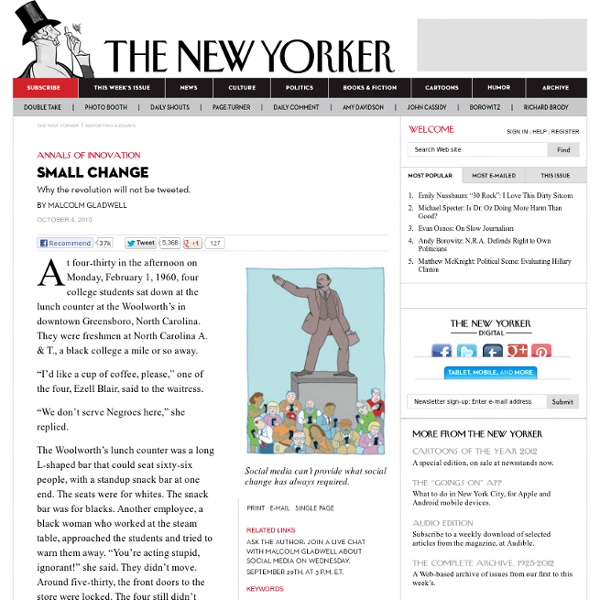Kester Brewin » ‘The Revolution will not be Tweeted’ | Real Sacrifice will never happen online
Excellent piece by Malcolm Gladwell in the New Yorker, casting a sceptical eye over the optimistic view that social networks can and do lead to increased social action. His argument is not that they cannot have a good impact, but that the sort of impact they might have is very different from the hard work of political activism that brought about the end to segregation. Old style activism depended on ‘strong ties’ – people who probably knew one another, and were very committed to a single cause, with their lives and values tied up in it. Whereas… The kind of activism associated with social media isn’t like this at all. But weak ties rarely lead to high-risk activism. Donating bone marrow isn’t a trivial matter. His conclusion is something we need to take careful note of: Social networks are effective at increasing participation—by lessening the level of motivation that participation requires.
The Revolution Will Not Be Tweeted (Unless It Is) : All Tech Considered
hide captionSocial media platforms may not create revolutions, but they sure can amplify them. Jason Nicholls/via Flickr For those who were sure that Twitter, Facebook and the realtime web could either manufacture or replace personal qualities such as being courageous, determined, selfless, disciplined, steadfast and having a charismatic ability to inspire and lead others in moments of great historical importance, I’ve got some bad news. It turns out that’s not case. In his recent New Yorker piece, Small Change, Malcolm Gladwell argues that the social web does not fundamentally change the nature of revolutions. By the end of the month, there were sit-ins throughout the South, as far west as Texas. Yes, folks. The realtime, social web is clearly not a required element to organize and execute a high impact revolution. Gladwell goes on to argue that that Facebook and Twitter create a kind of connectedness that is ultimately the opposite of what’s required for true activism.
Sorry, Malcolm Gladwell, the revolution may well be tweeted | Leo Mirani
For a man who has devoted a significant part of his life to documenting "how little things can make a big difference", Malcolm Gladwell is surprisingly dismissive of the power of social networking to effect change. In the latest issue of the New Yorker, he writes that the role played by Facebook and Twitter in recent protests and revolutions has been greatly exaggerated. Gladwell's argument is that social networks encourage a lazy activism that will only extend as far as "liking" a cause but not actually doing anything about it. Gladwell is right to be sceptical of social media's rah-rah brigade. But in claiming that all social networks are good for is "helping Wall Streeters get phones back from teenage girls", Gladwell ignores the true significance of social media, which lies in their ability to rapidly spread information about alternative points of view that might otherwise never reach a large audience. On Twitter, it is possible to follow journalists tweeting live from Srinagar.
Malcolm Gladwell Is #Wrong
Essay Maria Popova Malcolm Gladwell's take on social media is like a nun's likely review of the Kama Sutra — self-righteous and misguided by virtue of voluntary self-exclusion from the subject. But while the nun's stance reflects adherence to a moral code, Gladwell's merely discloses a stubborn opinion based on little more than a bystander’s observations. Gladwell, who has built a wildly successful career curating and synthesizing other people's research for the common reader’s consumption, has been surprisingly remiss in examining the social web’s impact on various forms of activism. Gladwell's argument rests on two main ideas: first, that the social web is woven of what he calls "weak ties" between people, whereas activism is driven by "strong ties." Let’s look at Gladwell's definition of activism, or lack thereof. We need a definition of what activism is, not what it is not, before we can argue for or against its existence. What does this have to do with activism? Viva la #revolución.
Your (Brilliant) Responses to Gladwell on Social Media and Activism - Alexis Madrigal - Technology
The comments in response to my thoughts on Malcolm Gladwell's latest New Yorker piece about social media and activism are so extraordinary that they deserve their own post. Here are highlights, but in situ. It's great. I love being shown up by our readers. These comments convince me that we're on the right track here on the Technology channel. Cynic provides great context: The key to Gladwell's error lies in the examples he offers. Tim Carmody just nails that movements have always been built on weak and strong ties: Finally, you can't say that the weak ties in the Civil Rights movement weren't valuable. David Dobbs provides a counterexample and points Gladwell cherry picked: Gladwell makes some rather sweeping statements himself that don't quite hold up -- and misses, as you note, that weak ties can generate strong ties. Tim Maly counters, noting Gladwell's not just after strawmen: Heather Gold lays out the case for decentralized, networked action:
Small Change. Why the revolution will not be tweeted
Small Change. Why the revolution will not be tweeted Posted on 05 October 2010 by jrobes Malcolm Gladwell hat sich die Frage gestellt, welche Art von Aktivitäten eigentlich durch Social Media und Social Networking initiiert werden. Und ist dazu in die 1960er Jahre zurückgegangen, in die Zeit der Bürgerrechtskämpfe in den USA. “Fifty years after one of the most extraordinary episodes of social upheaval in American history, we seem to have forgotten what activism is.” Ein “must read”! Popularity: 71% [?]



